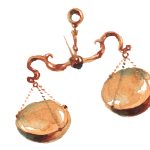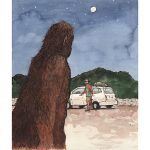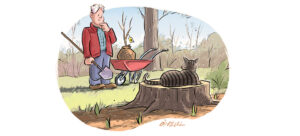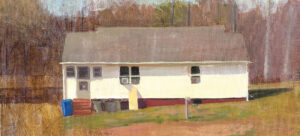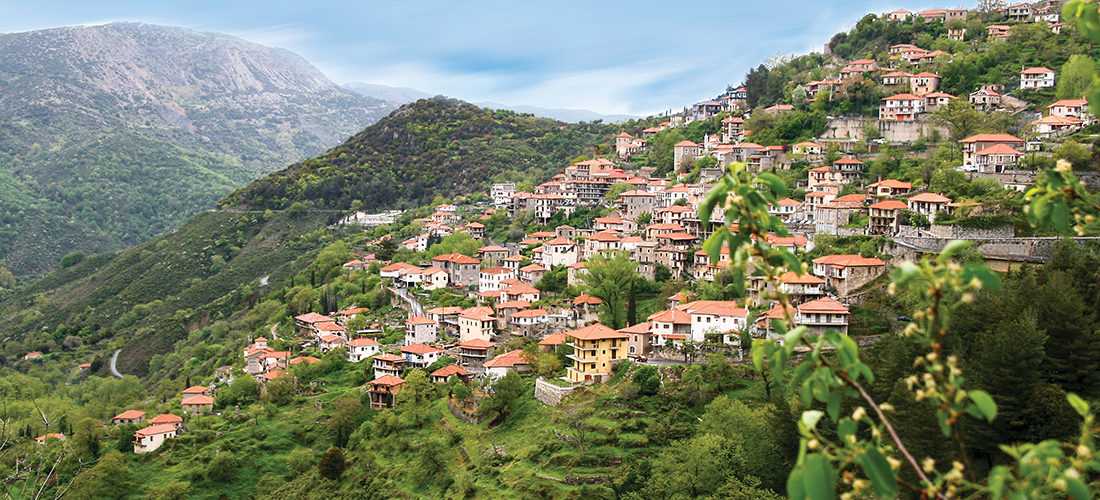
Homeward Bound
The answers to lifelong questions are writ in stone
By Maria Johnson
“Let’s go for a little drive.”
My dad said this on Sunday afternoons when I was a kid.
It was more gentle command than invitation, but I don’t remember anybody balking.
So the four of us — he, my mom, my brother and I — piled into whatever American-made V-8 living-room-on-wheels he was driving at the time and went along for the ride.
Usually, the excursions involved looking at other people’s houses, rolling through more expensive neighbors at a speed that would get you flagged on NextDoor these days.
Sometimes, the objects of our gawking were for sale — often my parents had seen them advertised in that day’s newspaper — but most of the places we ogled were not on the market.
What was the point? To drive. To dream. To discuss.
In hindsight, it’s tempting to say that Daddy — a civil engineer with a lifelong love of architecture, especially the work of Frank Lloyd Wright — was pushing us toward a sense of aesthetics there in his rolling salon. I honestly doubt that’s what he set out to do. But that’s what happened.
We followed his lead. As a naturalized U.S. citizen, he spoke better English than most of his fellow Americans, but he lapsed into his native Greek to praise some homes with a hearty “oraio” (nice) while discounting others with a sad “po-po-po-po.” (What a shame.)
The winners, in his opinion, shared a few traits. They had clean lines, proportionate features and they harmonized with their surroundings. Size had nothing to do with it. Ostentatious homes were kicked out immediately.
I suppose that’s how he could call our modest ranch home in Lexington, K.Y., in the heart of horse country, “a beauty.” He also praised my mom’s childhood home, a two-bedroom bungalow in Spencer, N.C., where we visited my grandparents every summer.
I never saw my father’s boyhood home in Greece, but I wondered if it molded his way of seeing.
“What was it like?” I asked him.
“Rock,” he said with a smile.
“Do you think you could find it now?”
“I don’t know, honey-mou,” he said, using the endearing suffix. “It might not be there any more.”
“Do you remember what it looked like?”
“I remember there was a crack in the wall from an earthquake,” he said.
“Well,” I teased. “That narrows it down.”
He chuckled and added a hopeful line.
“One day, I’m taking our family to Greece.”
He never did. But I was still curious about the house.
One day, I thought, maybe I would find it. My chance came earlier this year.
My husband, our two grown sons and I were headed to Greece. We would spend most of our time in my father’s village, Lagadia, which clings to the side of a mountain in the Peloponnese, the paw-shaped peninsula that claws at the turquoise seas west of Athens.
More than anything, we wanted to absorb the culture: to feel, hear, see, smell, touch and taste what shaped my dad. Finding his boyhood home would be a bonus. And a miracle.
I had no address, no picture no known relatives living in Lagadia, and no guidance from my dad, who died in 2015 at age 95. All I had were several downsized paper copies of a family tree that he had mined from his parents’ memories when he was 18. The handwritten chart went back to 1821, the year Greece launched a successful war of independence against the Ottoman Empire. Would that be enough?
Hope came in the form of Dora Tasiopoulou, who, with her builder-husband Takis, owns the inn where we stayed, Agnantio Studios and Suites.
On our third night, Dora, who speaks excellent English, assembled a few of the village elders in the family’s restaurant, Aroma Café, which is captained by Takis’ brother, Christos.Dora, who also runs a middle school in the nearby city of Tripoli, summarized the family tree to the old heads. She occasionally turned to ask me a question in English, then slid back into Greek. When she ticked off the names of my father and his siblings, one of the men perked up. Was my dad’s brother, Apostolos Yiannacopoulos, a doctor? Yes. Uncle Paul, as I knew him, was a professor of radiology at the University of Athens. Heads nodded. More words flowed. Dora turned to me with a smile and said, “We found your house.”
One of the men, Mr. George, lived two doors down from Uncle Paul’s family home, which would have been my dad’s family home, too.
Together, we made a plan. The next morning, Dora’s father-in-law, Mr. Dimitri, would take us to Mr. George’s cousin, who would take us to Mr. George, who would take us to my dad’s childhood home.
What else could we say but “OK”? It was the only way.
Historically, Lagadia — once home to more than 10,000 people, now inhabited by fewer than 300 souls — is known for its stone masons, so most of its structures are fashioned from native rock and knit together by a web of mortared walkways, alleys, walls and stairs. There are no street names, house numbers or formal property records.
You want to find a place? You rely on word-of-mouth and memory.
What were the odds that we would find both in the four days we happened to be there? A hundred years after my dad was born?
Statistically speaking, we had just won the lottery — in the warmth of the people.
The next morning, Mr. George led us through a labyrinth of walkways to my Dad’s home.
The first thing my eyes fell on was a burst of fuchsia roses in a stone planter beside the front door. My grandmother, Maria, loved roses. I looked at the luscious petals as a greeting: “Welcome to my home.”
The L-shaped home hugged a slope. Imagine a house with a walk-out basement. And the front door on the side. A walled garden was on the low end. The garden was overgrown. The home’s red-tile roof had fallen in. The tops of the upper walls had been chewed off by time. The floors between stories had collapsed. Plants and small trees sprouted from debris inside.
No one had lived there for decades. It was, as the locals would say, “a ruin.”
But not to me. My dad’s stories came to life in front of me.
On the lower level, I saw the low vaulted ceiling of the kitchen where he would have begged the family’s young housekeeper, Christitsa, for fish. I could make out the remnants of the fireplace where my grandmother scooped ashes to smudge behind my dad’s ears to make him imperfect, thus warding off the evil eye.
I saw my grandfather sipping stout Greek coffee from a tiny china cup, sliding the saucer across a tablecloth to hide burn marks left by the falling ash of his unfiltered cigarette.
I saw my dad as a child, wearing what he called “short pants,” walking to church just 50 steps away, and to his school another 25 strides beyond. I saw him chasing a soccer ball on the stony landings around his home.
Right here.
He drew his first breath.
The high, innocent notes of his little-boy voice filled the air.
His mother watched him through these windows.
And now, a century later?
Bees buzzed around the salvia, thistle and sage that sprang from crevices in the tightly-stacked stone walls.
A fig tree growing inside the walls was setting fruit.
Roses beamed at us.
We stood in the morning sun, blinking through tears.
We had come 5,000 miles to look at someone else’s house.
It was, we agreed, handsome. Natural. Simple. Well-built. Suited to its place.
Oraio. OH
Maria Johnson is a contributing editor of O.Henry. Contact her at ohenrymaria@gmail.com.

